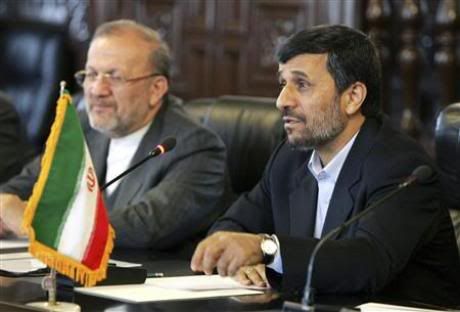
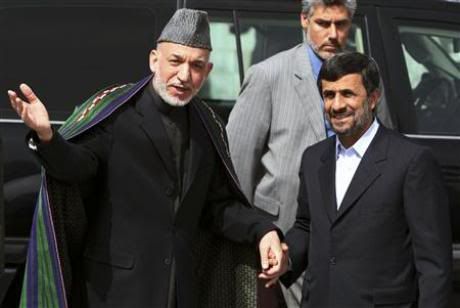
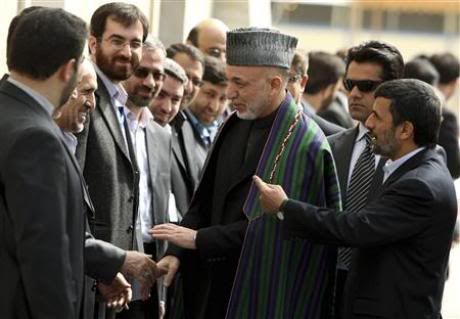
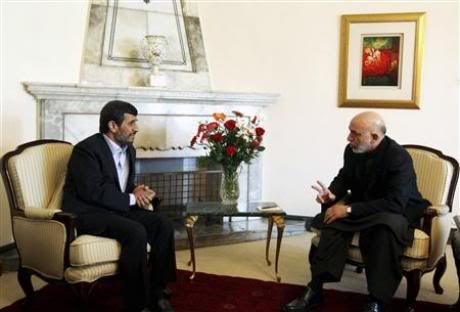

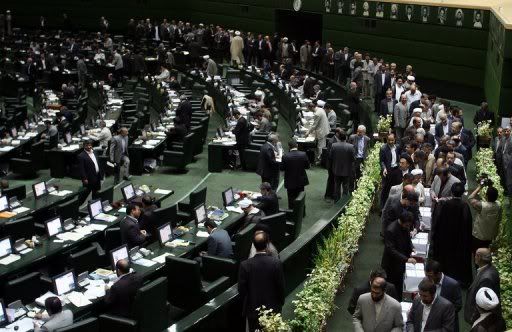
Iranian MPs queue to vote at the parliament in Tehran
What role Pakistan plays in any peace effort aimed at the Taliban is likely to rank high on the agenda during Afghan President Hamid Karzai's two-day visit to Islamabad that started Wednesday.
Pakistan has made it clear it wants a part in so-called "reconciliation" efforts between the Taliban and the Afghan government, but many Afghans resent Pakistani involvement in their affairs and question its motives. Still, Pakistan's history of links to the Afghan Taliban, a group it supported when the militants controlled Afghanistan in the 1990s, could make Islamabad an indispensable player.
In recent weeks, Pakistan also has reportedly arrested several Afghan Taliban leaders who were hiding on its soil. The military has confirmed that those held include Afghan Taliban No. 2 Mullah Abdul Ghani Baradar. What's still unclear is exactly why the arrests were made, with some analysts speculating Pakistan is trying to guarantee itself a seat at the negotiating table.
Pakistan has long tried to influence Kabul so that it can have an ally in the region and strengthen its position concerning its longtime rival, India. New Delhi, too, is trying to curry favor with the Afghans, and both Pakistan and India accuse each other of funding militant groups to destabilize their countries, with Afghanistan often the stage for the strikes.
An Afghan official recently alleged that a Pakistani-based group staged a recent attack in Kabul that killed 17 people, including seven Indians. The group, Lashkar-e-Taiba, has also been blamed for the 2008 attacks that killed 166 people in Mumbai, India. Pakistan has denied it had anything to do with either attack.
Karzai arrived in Islamabad on Wednesday evening and will stay through Thursday, said the state-owned Associated Press of Pakistan. He is to meet with top Pakistani officials including President Asif Ali Zardari and Prime Minister Yousuf Raza Gilani, according to the Pakistani Foreign Ministry.
It is the Afghan leader's first trip to Pakistan since he was re-elected.
Asked whether Pakistan will discuss handing Baradar over to Afghan authorities — which would likely mean the U.S. would have greater access to the Taliban commander — Foreign Ministry spokesman Abdul Basit said it was too soon to say.
"We are at present carrying out our own investigation," Basit told Pakistan's Express TV channel. "Once our investigations conclude we will take it from there."
The U.S. has sent thousands more troops to Afghanistan and is waging offensives in the country's south, the Taliban's primary stronghold. Officials say the U.S. is not engaged in any direct peace talks with the Islamist militia, but it has signaled support for the Afghan government's efforts.
Getting key Taliban leaders to agree to talks may be the toughest test. A three-day conference in Kabul starting April 29 is expected to lay out a way to pursue the peace effort and a "reintegration" program aimed at bringing lower-level Taliban fighters back into the broader Afghan society.
Iranian lawmakers on Tuesday scuppered President Mahmoud Ahmadinejad's plans to cut energy subsidies by approving only half the savings wanted by his government, news agencies reported.
Lawmakers had on Monday passed a broad outline of the budget for the year to March 2011, but on Tuesday blocked a specific proposal that would have saved the government 40 billion dollars.
Despite Ahmadinejad's pleas in parliament, 111 MPs voted against the subsidy cuts, while 105 were in favour and 15 abstained, ISNA news agency said.
Instead, "lawmakers agreed to allocate 20 billion dollars of income from a subsidiary plan in next year's budget," Mehr news agency reported.
Prior to the vote, Ahmadinejad had said the expected 40-billion-dollar budget boost would not stoke inflation.
"If this sum is allocated, inflation will not rise but will fall because there will be no increase in money supply," a lawmaker quoted Ahmadinejad as telling parliament, according to state media.
The budget for the year to March 2011 marks the start of a major plan to scrap costly subsidies on energy and goods, in turn reducing government expenditure.
Under the plan, subsidies which currently cost it as much as 100 billion dollars a year would have been withdrawn gradually, with the process due to end in March 2015.
On Monday, lawmakers had approved an overall 347-billion-dollar budget for the year to March 2011 based on an oil price of 65 dollars a barrel.
The approved bill is significantly higher than the 298-billion-dollar budget for the current Iranian year ending on March 20, but less than the 368.4-billion-dollar one Ahmadinejad put to parliament in January.
Iran earns 80 percent of its total revenues from oil exports but a high inflation over the past few years has severely hit economic growth.
Iranian President Mahmoud Ahmadinejad and Defense Secretary Robert Gates traded barbs on Wednesday during briefly overlapping visits to Afghanistan, where Washington has troops at war but Tehran has growing clout.
Ahmadinejad, who arrived as Gates was wrapping up a three-day visit, told a news conference alongside Afghan President Hamid Karzai that U.S. and Western troops would never defeat terrorism by waging war in Afghanistan.
Gates said earlier in the week Iran was playing a "double game" in Afghanistan by being friendly to the government while trying to undermine the United States. He said on Wednesday he had passed those concerns on to Karzai.
Washington, which will have 100,000 troops in Afghanistan by the end of 2010, says it believes Iran provides some support for militants there, although not nearly on the same scale as in Iraq, another Iranian neighbor where U.S. troops are fighting.
The Afghan insurgency is mainly led by Sunni Islamists, who are long sworn enemies of Shi'ite Iran.
Tehran blames Western military intervention in Afghanistan for causing instability and Ahmadinejad turned Gates' earlier comment around.
"Why is it that those who say they want to fight terrorism are never successful? I think it is because they are the ones who are playing a double game," Ahmadinejad said.
"They are the ones who set the terrorists on their course and now they say: 'Now we want to fight them'. Well they cannot, it is impossible," he told a news conference with Karzai.
As if addressing Gates, he said: "What are you even doing in this area? You are from 10,000 km over there. Your country is on the other side of the world. What are you doing here?"
Shortly before the news conference started, Afghan security guards anxiously collected half-empty bottles of mineral water from reporters. One said it was in order to prevent anyone from throwing the bottles at Ahmadinejad.
"UPFRONT GAME"
Gates left Kabul shortly after Ahmadinejad landed. Before leaving he described the timing of the Iranian leader's visit as "clearly fodder for all conspiratorialists."
"I told President Karzai that we want Afghanistan to have good relations with all of its neighbors. But we also want all of Afghanistan's neighbors to play an upfront game dealing with the government of Afghanistan."
Iran has wide and growing influence in Afghanistan, especially the west of the country where it has important economic ties. Millions of Afghans were refugees in Iran during three decades of war, and a dialect of Iran's Farsi language is one of the two state languages in Afghanistan.
Karzai said at the news conference with Ahmadinejad "we assured our brothers in Iran that we do not want our soil to be used against our neighbors."
Iran was the only major regional country to reject an invitation to an international conference on Afghanistan in London in January.
Despite their suspicions, Western countries have praised Tehran's efforts in combating the drug trade. Iran has a serious heroin addiction problem, while Afghanistan produces nearly all the world's opium used to make heroin.
Karzai is due to fly to Pakistan later on Wednesday, meeting the leadership of another big neighbor.





0 comments:
Post a Comment